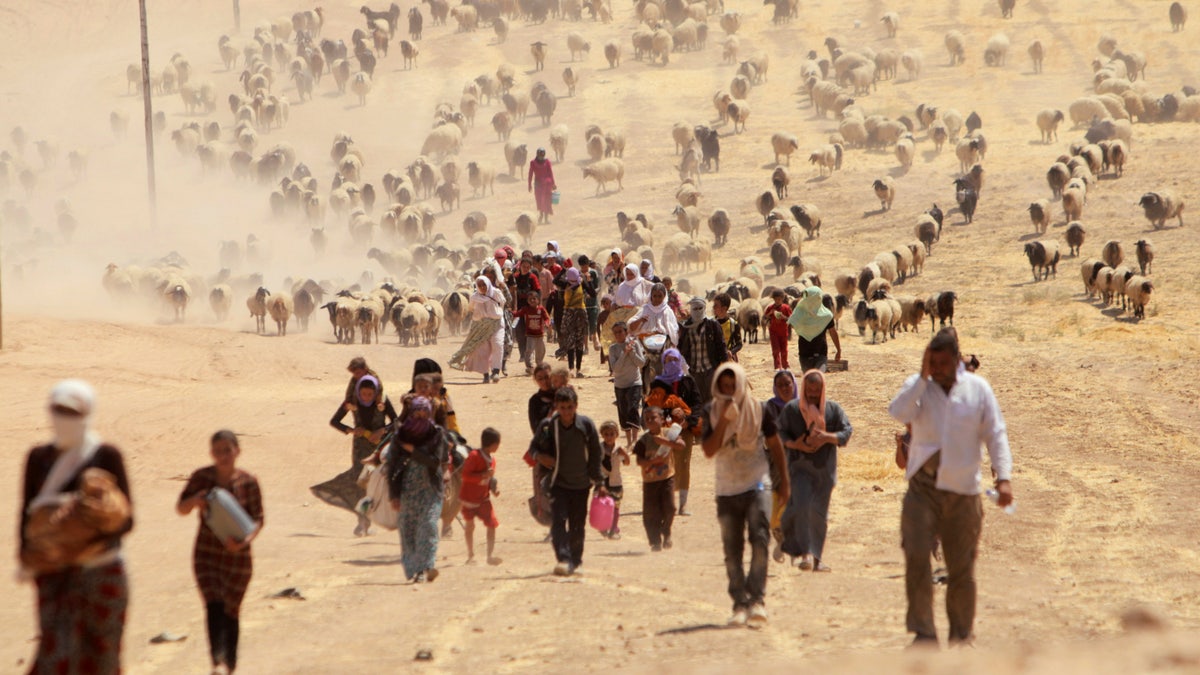
Displaced people from the minority Yazidi sect, fleeing violence from forces loyal to the Islamic State in Sinjar town, walk towards the Syrian border, on the outskirts of Sinjar mountain, near the Syrian border town of Elierbeh of Al-Hasakah Governorate August 10, 2014. REUTERS/Rodi Said/File Photo - RTX2GIYQ
Members of one of the world’s most persecuted religious groups, the Yazidis of northern Iraq, are struggling over whether to leave their ancestral homeland or rebuild their diminished and traumatized community outside the Middle East.
Some Yazidi leaders oppose migration and are seeking foreign help to re-establish their community in Iraq’s Sinjar region. Other Yazidi leaders support migration, and various western governments are welcoming them as refugees.
Yazidi religious leaders are among those opposed to resettlement, fearing that being scattered will mean the end of their identity. Baba Chawish, the head of the Yazidi’s Spiritual Council and guardian of their holiest site, Lalish, told FoxNews.com that they desperately need protection and help, emphasizing that most Yazidis want to be able to sleep in their own houses and own beds and that if they have to leave Yazidis will “vanish.”
That’s a view held by many lay people in the Yazidi community.
“Yazidis are a small religious minority. They have lost people in genocidal campaigns and vast areas of land in the past two hundred years,” one Yazidi person in Iraq, who requested anonymity, told FoxNews.com. “Immigration is another major threat to the future of this religion and ancient culture.”
In addition, the head of Iraq’s Kurdish Regional Government, Nechervan Idris Barzani, recently released a statement opposing plans for thousands of Yazidis to be permanently resettled in Canada, emphasizing that he is opposed to any “organized attempt to mass migrate members of its community.”
Yazidi leaders who want their community to stay in Iraq’s Sinjar region, where they have lived for centuries, agree that members are free to leave. But they plead with western governments to fund and assist them in rebuilding their villages rather than welcoming Yazidis as refugees.
“Migration will have a negative impact on the Yazidi religion in Iraq and Kurdistan. We encourage Yazidis to remain,” said Qewel Bahzad, a member of the Yazidi Spiritual Council.
The migration controversy deepened on Monday after the KRG’s security services closed the offices of Yazda, a Yazidi advocacy group, in the Iraq-Kurdistan region, accusing the organization of failing to abide by the terms and conditions for NGOs in the region.” An official source told FoxNews.com that there have been grave concerns over Yazda’s encouraging migration. Yazda confirmed on social media that those offices were closed but stated that the closure was for “unknown reasons.”
Beyond concerns over the dangers of migration are worries that, longer term, Iran will benefit from any Yazidi exodus out of Iraq. Sinjar is contested land between the Baghdad Central Government and the Kurdish Regional Government, although it is currently under control of the Kurdish Peshmerga. Some officials in the region have also expressed worry that Iran, which has significant influence in Baghdad and is known to garner support with various minorities in Iraq through financial incentives to boost its foothold – has its eyes set on the traditionally Yazidi homeland close to the Syrian border.
If secured, a reported long-held Iranian goal, the land bridge would enable Iran and its proxies clear passage for supplies and oil between the Mediterranean and Tehran and guarantee a crescent of influence.
“The fewer people in the way,” one Iraq-based source added, “the less resistance and the less trouble.”
On the other side of the debate is Yazda and its best-known representative, Nadia Murad, a Nobel Peace Prize nominee and the UN’s first Goodwill Ambassador for the Dignity of Survivors of Human Trafficking. The 22-year-old, who is represented by British lawyer Amal Clooney, catapulted onto the international stage in December 2015 when she documented for the UN Security Council how jihadists assaulted her village in early August 2014 and her subsequent time in captivity as a sex slave.
Nadia has traveled the world advocating for safe passage and visas for Yazidis. She urges numerous western governments to resettle as many Yazidi refugees as possible, stressing that they are victims and “have the right to seek a safe country that safeguards (their) dignity.”
Murad Ismael, Yazda’s executive director, said the international community needs to grasp how chronic and acute Yazidi suffering has been.
“Genocide was committed against the Yazidis. They were not protected by the state,” he said. “Yazidis should be allowed to relocate if they choose to be relocated.
Meanwhile, western governments are already responding to appeals like Nadia’s.
Canada’s House of Commons voted unanimously in late October to begin resettling Yazidis. Sonia Lesage, spokesperson for Immigration, Refugees and Citizenship in the Canadian government told FoxNews.com that they are “committed to offering protection to the Yazidi population at risk,” and that individuals who are accepted for resettlement will have full permanent resident status upon arrival.
Canadian MP Michelle Rempel echoed such a sentiment, saying that while Canada has resettled over 25,000 refugees, mostly Syrian, almost no persecuted ethnic and religious minorities have been referred, something which “needs to change.”
Scottish members of parliament are now urging their government to follow suit, and Murad is also encouraging the U.K and Australia to open its doors permanently to Yazidis.
The United States, too, is putting plans in place to resettle Yazidis. According to Danna Van Brandt, public diplomacy and public affairs advisor in the U.S State Department, the U.S Refugee Admissions Program, actively resettles Yazidis and has many cases in process. The first tranche of cases is due to be submitted in early 2017.







































